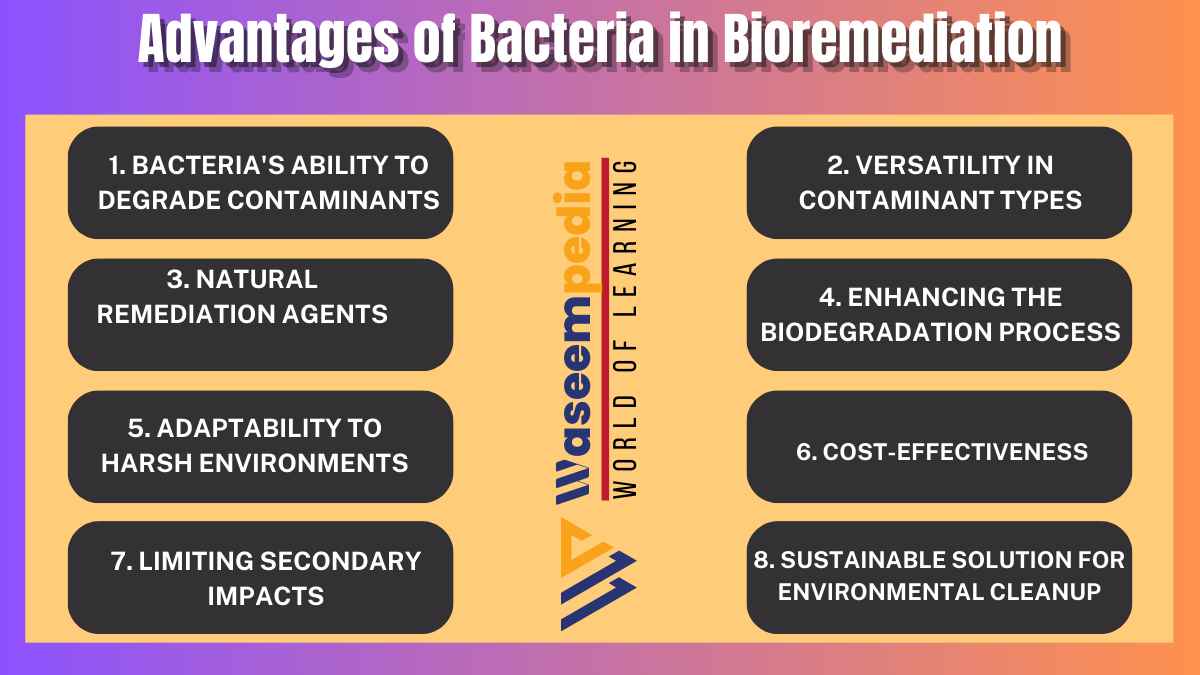Bioremediation is a sustainable and environmentally friendly approach to clean up polluted sites and mitigate the impact of contaminants. In this process, bacteria play a crucial role in breaking down and transforming harmful substances into less toxic forms, ultimately restoring the balance of ecosystems.
The advantages of bacteria in bioremediation are numerous, and their unique abilities make them invaluable in addressing environmental contamination. In this article, we will explore the advantages of bacteria in bioremediation and shed light on their significant contributions.
Bacteria play a critical role in bioremediation, offering significant advantages in addressing environmental contamination.
Their ability to degrade a wide range of contaminants, versatility in targeting different pollutant types, natural remediation capabilities, and adaptability to harsh environments make them invaluable in the restoration of polluted sites.
With their cost-effectiveness and capacity to limit secondary impacts, bacteria-mediated bioremediation stands as a sustainable and efficient approach to remediate contaminated environments.
Introduction Advantages of Bacteria in Bioremediation
Environmental contamination poses significant risks to ecosystems, human health, and the overall well-being of our planet. Bioremediation offers a sustainable solution by utilizing natural processes to degrade and eliminate pollutants.
Bacteria, with their diverse metabolic capabilities, are at the forefront of bioremediation efforts, demonstrating remarkable advantages in treating contaminated sites.
Understanding Bioremediation
Bioremediation involves the use of living organisms, such as bacteria, to degrade or transform contaminants into less harmful forms.
Bacteria play a vital role in this process by breaking down complex organic and inorganic compounds through enzymatic reactions, effectively reducing the toxicity of contaminants and restoring the environmental balance.
7 Advantages of Bacteria in Bioremediation
7 Advantages of Bacteria in Bioremediation are as follows.
1. Bacteria’s Ability to Degrade Contaminants
One of the primary advantages of bacteria in bioremediation is their ability to degrade a wide range of contaminants. Bacteria produce various enzymes that can break down diverse pollutants, including petroleum hydrocarbons, heavy metals, pesticides, chlorinated solvents, and more.
These enzymes target specific chemical bonds within contaminants, initiating their degradation into less toxic byproducts.
2. Versatility in Contaminant Types
Bacteria exhibit remarkable versatility in their ability to degrade different types of contaminants. They are capable of targeting both organic and inorganic pollutants, adapting to a wide range of chemical structures.
This versatility allows bacteria to address diverse types of contamination, making them an ideal choice for bioremediation strategies across various industries and environments.
3. Natural Remediation Agents
Bacteria serve as natural remediation agents, harnessing the power of natural processes to clean up contaminated sites. Bioremediation with bacteria offers an eco-friendly alternative to more intrusive and destructive remediation methods, such as excavation or incineration.
By utilizing bacteria, the remediation process aligns with the principles of sustainability and promotes the preservation of ecosystems.
4. Enhancing the Biodegradation Process
Bacteria contribute to the enhancement of the biodegradation process in several ways. They can be genetically modified or engineered to produce more efficient enzymes for specific contaminants, accelerating the degradation rate.
Additionally, bacteria can be stimulated through the addition of nutrients or electron acceptors, optimizing their metabolic activity and enhancing the overall biodegradation process.
5. Adaptability to Harsh Environments
Bacteria have proven their adaptability to a wide range of environmental conditions, including harsh and contaminated sites. Some bacteria have developed mechanisms to withstand extreme temperatures, pH levels, salinity, and toxic substances present in contaminated environments.
This adaptability enables bacteria to thrive and perform bioremediation in challenging conditions that may be inhospitable to other organisms.
6. Cost-Effectiveness
Bioremediation with bacteria offers a cost-effective solution compared to traditional remediation methods. Excavation, transportation, and incineration of contaminated materials can be expensive and logistically challenging.
In contrast, bioremediation requires fewer resources and infrastructure, making it a more economically viable option for large-scale remediation projects.
7. Limiting Secondary Impacts
Another advantage of bacteria in bioremediation is their ability to limit the production of secondary impacts. Unlike some physical or chemical methods of remediation, which can generate hazardous byproducts or residuals, bacteria-mediated biodegradation tends to produce benign end products.
This reduces the risk of introducing additional environmental concerns during the remediation process.

